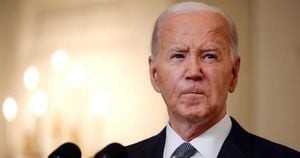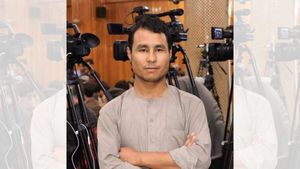Since the conclusion of the COP29 climate summit held in Baku, Azerbaijan, there's been a significant uproar among climate activists and developing nations about the outcomes of the conference. Many have labeled the agreement reached at these talks as deficient, particularly for countries already grappling with the stark effects of climate change. This dissatisfaction is leading to rising expectations for COP30, which will take place in Brazil.
The conference, which was heavily centered around climate finance—dubbed the "Finance COP"—ended with commitments amounting to $300 billion annually, far below the $1.3 trillion annual assistance demand from developing nations. This amount is seen as insufficient to support these nations effectively as they struggle to transition to sustainable economies and counter the damages wrought by climate change.
"Rich countries have failed to honor their responsibilities, showing up with rigid unwillingness to meet this moment with the ambition required to address the climate crisis," stated Namrata Chowdhary, the public engagement head at the climate advocacy group 350.org. This sentiment was echoed widely among those representing underserved communities globally.
Upon wrapping up the summit, many developing countries voiced disappointment over the insufficient pledges and the lack of trust garnered from wealthier nations. COP29 offered hope for moving forward, serving as merely what some are calling "yet another starting point" rather than the substantial progress stakeholders hoped for, according to releases from 350.org.
Marcio Astrini, the executive secretary of the Brazilian Climate Observatory, vocalized his concerns by declaring Azerbaijan's COP29 presidency as "disastrous." These impressions arose mainly due to the perceived lack of adequate negotiations and the procedural issues during the event held by Azerbaijan, a nation often criticized over its environmental and human rights stance.
Recent commitments from developed nations have also drawn heavy criticism. The $300 billion annual figure failed to meet expectations of many developing countries. Gerry Arances, from the Center for Energy, Ecology, and Development, went so far as to describe the financial pledge as "a hollow promise." The consensus was clear: The forthcoming commitments would do little to support the frontlines of the climate crisis.
Now, as the world turns its gaze toward Brazil for COP30, hopes are pinned on President Luiz Da Silva's administration, which recently reclaimed leadership after years of climate denial under Jair Bolsonaro. Brazil currently holds the title of the largest rainforest on the planet—an area of significant importance to climate action.
The Brazilian government is viewed as having already made considerable strides post-Bolsonaro, with some progress noted on reducing deforestation and emphasizing the need for ambitious climate policies. Marcio Astrini stated, “COP30 will have to be very competent and dedicated to fill the gaps left by this conference, promote the advancement of ambition, and keep the 1.5°C goal alive.”
Meanwhile, climate advocates urge Brazil to bolster efforts and act decisively on climate finance issues and call for accountability from developed nations on their climate commitments. There’s hope for Brazilian leadership to create frameworks allowing for more effective and transformative climate action approaches.
The discussions leading up to COP30 are expected to be heated, particularly against the backdrop of distrust established during COP29. Indeed, developing nations are now advocating for transparency and diligence from wealthy nations, emphasizing the need for substantial change rather than empty promises.
Shiva Gounden, head of Pacific at Greenpeace Australia Pacific, reaffirmed this sentiment by declaring, "We do not have the luxury of losing hope.” Heads are likely to turn to Brazil's leadership style, set against the question: Can Brazil rise to the occasion, truly leading the conversations necessary to combat climate change? There’s definitely pressure to do so, as the world awaits urgent, impactful leadership.
Against this backdrop, the road to COP30 will necessitate not just financial commitments but also transparency and genuine collaborative efforts from all nations involved, particularly wealthy nations who have historically contributed to climate challenges.
Global climate activists believe the disappointing outcomes of COP29 will only serve to galvanize their movements as they prepare for the next summit. Activists plan to keep pressing the fossil fuel industry, holding them accountable for their contribution to climate disasters, with many stating they will bring these issues to the forefront at COP30.
The dissatisfaction from COP29 didn’t solely arise from funding disputes; it was also fueled by concerns surrounding the lack of focus on fossil fuel transitions. The final agreements surprisingly omitted clear references to fossil fuel commitments—an omission seen by critics as undermining the integrity of COP discussions aimed at reducing carbon emissions.
Looking back over the years of negotiations, developing countries have called attention to the trend of high ambitions versus low outcomes, leading many to wonder if meaningful progress can be made at these summits at all. With mounting natural disasters coinciding with lackluster financial commitments from wealthier nations, the plight of developing nations remains precarious.
Observing the rhetoric from leaders and activists alike, the pressure mounts on Brazil to not dance around these complex realities but face them head-on. Will the most extensive rainforest on Earth serve as the backdrop to transformative climate commitments, or will history simply repeat itself?
Only time will tell how Brazil, as the next host, navigates the complex world of climate finance and international commitment. The results of COP30 could either mark the beginning of renewed collaboration or confirm the deep divides present since climate discussions began. Overall, the stage is now set for Brazil, and the expectations rest heavily upon its shoulders to bring forth genuine change.



